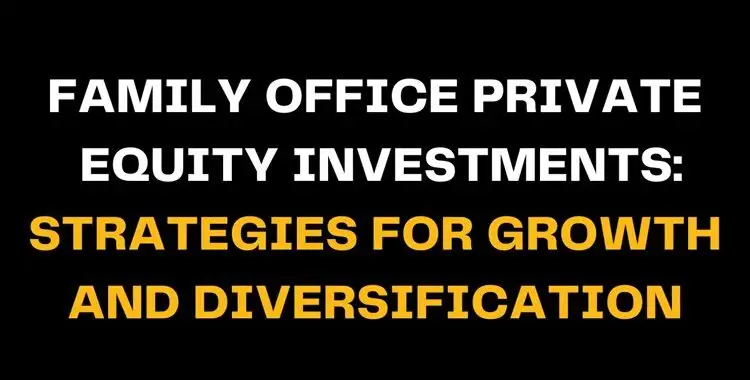Read Time4 Mins
Family offices, which are dedicated wealth management entities that manage the financial affairs of affluent families, often seek investment opportunities that can provide substantial returns while mitigating risks. Private equity investments have emerged as a popular asset class for family offices due to their potential for high returns and opportunities for growth and diversification. In this blog, we will explore the strategies that family offices can employ for private equity investments to achieve growth and diversification in their investment portfolios.
It involves investing in privately held companies that are not publicly traded. Family offices can invest directly in private equity deals or through private equity funds managed by professional investment managers.
It can offer several benefits for family offices, including potential for high returns, long-term investment horizons, and opportunities to actively participate in the strategic direction of the invested companies. However, private equity investments also come with inherent risks, such as illiquidity, lack of transparency, and operational and market risks. Therefore, it is crucial for family offices to develop sound strategies to effectively manage these risks and maximize the potential for growth and diversification.
- Thorough Due Diligence: Family offices should conduct thorough due diligence on potential private equity investments. This includes evaluating the financial performance and stability of the target companies, analyzing the market dynamics, assessing the competitive landscape, and evaluating the management team and their track record. Comprehensive due diligence can help family offices identify potential risks and opportunities associated with the investment and make informed investment decisions.
- Diversification: Diversification is a key strategy for managing risks in private equity investments. Family offices should aim to diversify their private equity portfolio across different industries, geographies, and investment stages. Diversification can help family offices mitigate concentration risk and reduce the impact of adverse events in any particular investment. It also provides opportunities for potential advantages through exposure to different industries and markets.
- Active Management and Value Creation: Family offices should actively participate in the strategic direction of the invested companies to drive growth and value creation. This can involve working closely with the management team, providing operational expertise, and leveraging the network and resources of the family office to support the growth initiatives of the invested companies. Active management can help family offices unlock the full potential of their private equity investments and enhance their returns.
- Long-Term Investment Horizons: They are typically long-term in nature, with investment horizons ranging from 5 to 10 years or even longer. Family offices should align their investment strategies with a long-term perspective, recognizing that private equity investments may require patient capital and may take time to realize their full potential. This long-term investment horizon allows family offices to weather short-term market fluctuations and capitalize on long-term growth opportunities
- Risk Management: Family offices should have robust risk management processes in place for their private equity investments. This includes monitoring the performance and financial health of the invested companies on an ongoing basis, identifying and addressing potential risks, and developing contingency plans for adverse scenarios. Effective risk management can help family offices protect their investments and optimize their returns.
- Co-Investments and Co-Sponsorships: Family offices can also consider co-investments and co-sponsorships as strategies for private equity investments. Co-investments involve partnering with other investors to jointly invest in a private equity deal, while co-sponsorships involve partnering with established private equity firms to invest in deals together. These strategies can provide family offices with access to diversified deal flow, enhanced deal sourcing capabilities, and reduced investment costs.
In conclusion, By employing strategies such as thorough due diligence, diversification, active management, value creation, long-term investment horizons, risk management, and co-investments or co-sponsorships, family asset management software can play a crucial role in optimizing the management and performance tracking of these investments.







